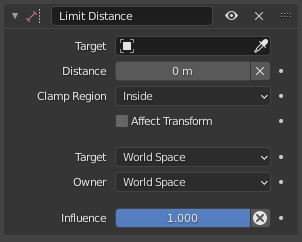Ràng Buộc Hạn Chế Khoảng Cách
The Limit Distance constraint forces its owner to stay either further from, nearer to, or exactly at a given distance from its target. In other words, the owner's location is constrained either outside, inside, or at the surface of a sphere centered on its target.
When you specify a (new) target, the Distance value is automatically set to correspond to the distance between the owner and this target.
Quan trọng
Ghi chú là nếu bạn sử dụng một ràng buộc như vậy trên một xương móc/mắc/kết nối thì nó sẽ không có ảnh hưởng gì hết, vì nó là đỉnh của Phụ Huynh, tức cái Điều Khiển vị trí gốc xương chủ sử hữu của bạn.
Tùy Chọn

Limit Distance panel.
- Mục Tiêu
Chỉ Danh của dữ liệu used to select the constraint's target, and is not functional (red state) when it has none. See common constraint properties for more information.
- Khoảng Cách
This number field sets the limit distance, i.e. the radius of the constraining sphere.
- Hoàn Lại Khoảng Cách
X When clicked, this small button will reset the Distance value, so that it corresponds to the actual distance between the owner and its target (i.e. the distance before this constraint is applied).
- Hoàn Lại Khoảng Cách
- Vùng Hạn Định
The Limit Mode select menu allows you to choose how to use the sphere defined by the Distance setting and target's origin:
- Bên Trong
The owner is constrained inside the sphere.
- Bên Ngoài
The owner is constrained outside the sphere.
- Bề Mặt
The owner is constrained on the surface of the sphere.
- Tác Động đến Biến Hóa
Transform operators will take the constraint into account to immediately restrict the resulting transform property values.
- Mục Tiêu/Chủ Nhân
Standard conversion between spaces. See common constraint properties for more information.
- Tác Động/Ảnh Hưởng
Controls the percentage of affect the constraint has on the object. See common constraint properties for more information.
Mẹo
Evaluating both owner and target in a Custom Space using the root bone or any other suitable parent bone will automatically scale the effective distance with the relevant part of the rig.